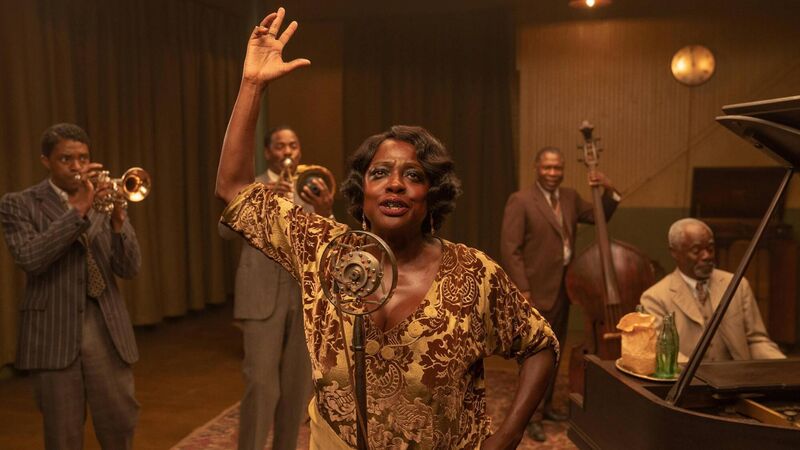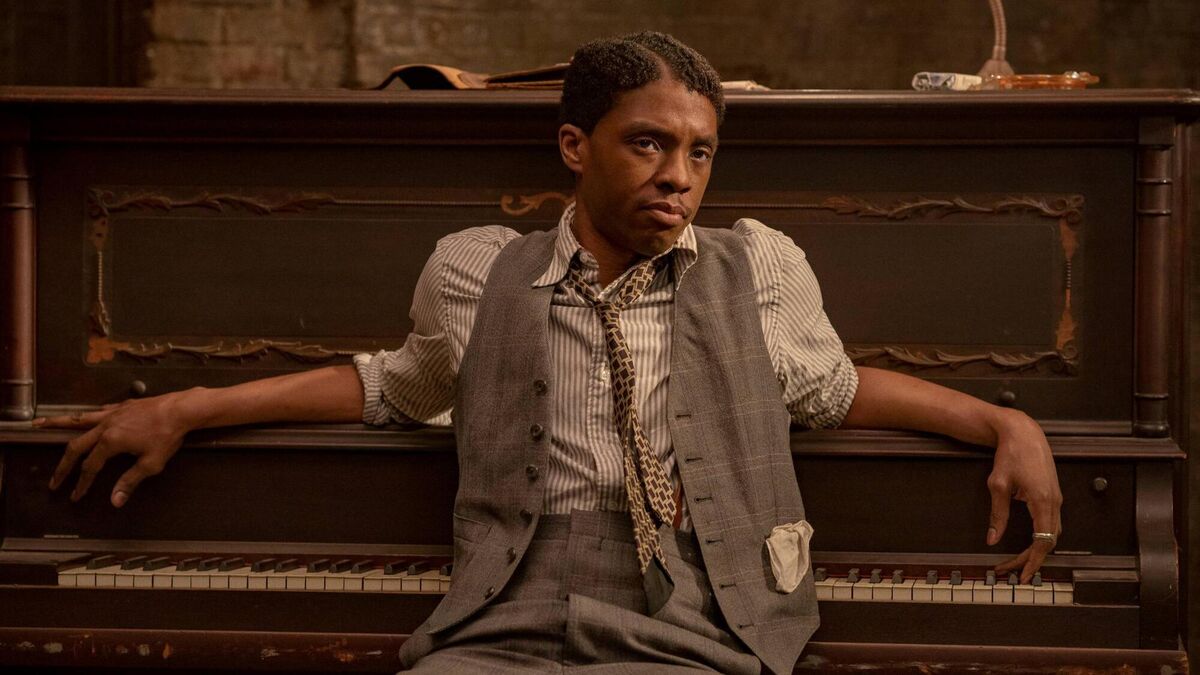Viola Davis: 'all the women in my life who are big, are very sexual. They do not apologise for their bodies'

Viola Davis in Ma Rainey's Black Bottom. In the background are Chadwick Boseman, Colman Domingo, Michael Potts and Glynn Turman.
Viola Davis dons a fatsuit, gold teeth and greasepaint to deliver what is a phenomenal performance in Ma Rainey’s Black Bottom, the tale of a formidable woman known as the Mother of the Blues.
Over five years between 1923 and 1928, Rainey and her band made over 100 recordings, making her one of the most powerful figures in US music at the time.
She was also a free-spirited character who sang about her bisexuality in some of her songs and was once arrested for holding an orgy in her home. The movie is already generating some serious Oscar buzz for both the actress and co-star Chadwick Boseman, who delivers a searing and raw performance as a young member of Rainey’s band who dares to challenge her musical choices. The world didn’t know it then, but the Black Panther star was secretly battling colon cancer and died this summer, aged just 43.
Davis relished the opportunity to play the upfront yet enigmatic Rainey, regarded as one of the most pioneering women in blues, and turned to another icon - Aretha Franklin - when it came to channeling her transformation.
“You’ve got to have a lot of courage,” she says of embracing the larger-than-life and assertive Rainey. “Ma Rainey definitely is someone who I think was big and she was bold, because she had to be. That's what happens when you're smack dab at a time period and in a culture that didn't see you. This is someone who's invisible.
“When I did my research, there were so many people who would talk about her, because there's not a lot of information out there. But the people who did talk about her, and a lot of them black people, would say she's ugly. And that's it. So you as an actor have got to do that work of figuring out what that is, who is she.
"I think that she literally has harnessed all the power and the value that she feels that she has, and she is not going to let up with it at all. It's a survival technique, which I absolutely understand. Being a black woman in America, I get it!”
Tony-award winning theatre and film director George C Wolfe brings the story, which centres around one difficult recording session in Chicago in 1927, to the screen.
Davis says characters like Rainey are often treated as unusual, but they are in fact common to her ancestry.
“In my world, within the African American community, there are a lot of Ma Raineys. My husband's mother, his grandmother was always cussing people out, letting their breasts hang out, were always outspoken, but it's only in the world of the context of white people that we become invisible, that we turn into something else. In reality all I know are Ma Raineys.
“Even with the padding, switching my hips, all the women in my life who are big, are very sexual. They do not apologise for their bodies. They wear the latest fashion, it's only in Hollywood that people hide when they get bigger.”
When she was preparing for what is a vivid transformation, Davis came across a photo of Aretha Franklin at her most voluptuous and shared it with designers.
“I was like: ‘This picture is beautiful. I want to have this shape, these measurements’, and she copied Aretha Franklin's measurements exactly to build this suit. When I put that suit on, I had a different freedom that I don't even have in my body. A different freedom in sexuality and expression that I didn't even know was in me. It helps because that's your job as an actor, to become that human being. That's your only job - not to copy someone else's performance. Not to get an Oscar. The wig helped, the sweat helped, the makeup helped, the teeth helped.” Davis says there are different considerations and obligations when it comes to playing a real person.

“It's different in that the facts are already out there. She had makeup like grease paint, she had a mouthful of gold teeth, she had a horse hair wig. And she was over 250 pounds. So you have to adhere to that. You can't say: ‘Oh, she's 250 pounds. But I don't want to do that’. There are absolute facts. But it is the same in that you still have to use your imagination. You have to be an amateur psychologist.
“This is a woman who would be at orgies on Thursdays. She was literally at orgies where she would be arrested. And on Sunday, she would be at church. On the one hand she would tell her band members: ‘I don't want you cussing, I don't want you drinking and I don't want you smoking’, but at the same time she'd go to a bar and beat the shit out of a 200-pound man. It's those kind of contradictions that can only be achieved when you observe life because life is a mass of contradictions.
"The only thing that's a little bit more comfortable about Ma Rainey is not a lot of people know her. The next character I'm playing is Michelle Obama. Now, that's scary.”
In the film Rainey comes across as a formidable character as she takes on the might of her (white) record-label bosses. She refuses to sing until her Coke arrives as per her contract, performs according to her own schedule, and takes down the ambitious young jazz musician (Boseman) who wants to bring new ideas and arrangements to the songs. What Davis most admired about the singer, she says, is that she knew and understood her sense of worth - an extraordinary characteristic for a black woman in Jim Crow-era America.
“It's like [US professor] Brené Brown says, that you do not have to barter for your worth. You don't have to hustle for it. You just have it. And I think that's what I've taken from Ma Rainey more so than any of my other characters. Certainly with Annalise Keating in How to Get Away with Murder, Aibileen Clark in The Help, Rose in Fences, all of them were bartering."
Davis says of them needed that one thing that kept them on their feet and kept them feeling valued.
"Rose needed her family and her marriage. Annalise Keating - lord knows what she needed. I mean, yes, she could tear someone apart in court, but then went home and guzzle the whole damn bottle of vodka, you know, so that she could temper that feeling of not feeling worthy.
“One of my favourite lines in the movie is: ‘Ma listens to the voice inside her. That's the only thing that matters to Ma’. There are people who take an entire lifetime to get to that.”
* Ma Rainey’s Black Bottom is now in cinemas and comes to Netflix on December 18th.


